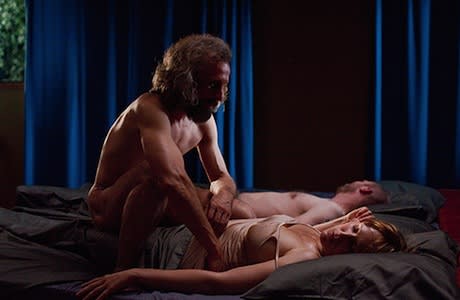Just as he did with previous efforts like Grimm and The Last Days of Emma Blank, Dutch raconteur Alex van Warmerdam throws a few darkly comic jabs at the bourgeoisie with Borgman. It has a similar preoccupation with architecture and class distinction, substituting abandonment and elder abuse with a sly, gently absurdist admonitory about the upper crust and their reliance upon the lower class.
In the opening, a vicar and miniscule mob scour the woods for the underground hideout where Camiel (Jan Bijvoet), a seemingly transient man of unspecified motivations, bunks. Happening upon it with the aid of dogs, he's forced to flee his quarters, alerting other subterranean dwellers in the area before retreating to an affluent neighbourhood where some nouveau architecture and Marina (Hadewych Minis), a comely mother of three standing in a window, attract his interest.
Initially, Camiel merely rings the doorbell and asks the patriarch, Richard (Joroen Perceval), if he can use their bath. He's rejected and beaten, retreating to their small guesthouse, where Marina finds and nurses him, feeling guilty about her husband's aggressive actions. Noting the strange confidence and seeming prescience of the vagrant — his initial claims that Marina had taken care of him ultimately come true — suggest that he's some sort of alien or demonic figure, which is reinforced by his introduction as an enemy of the church.
As Camiel gradually weasels his way into the lives of this cold, disconnected family, he brings along a gang of friends, casually poisoning some of the household helpers Marina and Richard employ to look after their land and children. What becomes clear, particularly after a pointed comment about Marina wanting to meet the boyfriend of her nanny, Stine (Sara Hjort Ditlevsen), before she allows him to sleep under their roof, is just how engrained foreigners and labourers are in their daily lives. Though they clearly care about their three children, it's always up to their staff to take care of the their needs, getting them to school on time and making them lunches.
Camiel, having supernatural abilities that are never fully articulated or realized, creeps into Marina's bedroom each night, hovering over her in the nude, injecting nightmares about domestic abuse into her psychological lexicon. While he could easily kill the family and use his ill-defined skills to obtain what he wants, there's an unspoken need for the family members to come to harsh decisions — chiefly murder — on their own. Like any devilish force, this vagrant works his magic through the power of suggestion and coy manipulation, leaving the family to implode by its own means.
While this structure aids in furthering the didactic implications, warning the rich not to rely so heavily on strangers under their employment, it doesn't quite sustain its logic. Why Camiel and his cronies go to such lengths to poison people slowly and bring in fake doctors never make a great deal of sense, as far as motivations go. We understand that said motivations involve infiltration, but the rhythms of how they operate are inconsistent.
While there's a dark comedy tone, the tenuous handling of the nastier material (dropping dead bodies into the water with their heads cemented in buckets) never quite shocks as intended. In fact, nothing about Borgman bites hard enough or has enough social vitriol to work as a critique or abstract comedy. It falls into a middle ground, titillating with some interesting ideas and enthralling imagery, but never realizing its potential.
(Films We Like)In the opening, a vicar and miniscule mob scour the woods for the underground hideout where Camiel (Jan Bijvoet), a seemingly transient man of unspecified motivations, bunks. Happening upon it with the aid of dogs, he's forced to flee his quarters, alerting other subterranean dwellers in the area before retreating to an affluent neighbourhood where some nouveau architecture and Marina (Hadewych Minis), a comely mother of three standing in a window, attract his interest.
Initially, Camiel merely rings the doorbell and asks the patriarch, Richard (Joroen Perceval), if he can use their bath. He's rejected and beaten, retreating to their small guesthouse, where Marina finds and nurses him, feeling guilty about her husband's aggressive actions. Noting the strange confidence and seeming prescience of the vagrant — his initial claims that Marina had taken care of him ultimately come true — suggest that he's some sort of alien or demonic figure, which is reinforced by his introduction as an enemy of the church.
As Camiel gradually weasels his way into the lives of this cold, disconnected family, he brings along a gang of friends, casually poisoning some of the household helpers Marina and Richard employ to look after their land and children. What becomes clear, particularly after a pointed comment about Marina wanting to meet the boyfriend of her nanny, Stine (Sara Hjort Ditlevsen), before she allows him to sleep under their roof, is just how engrained foreigners and labourers are in their daily lives. Though they clearly care about their three children, it's always up to their staff to take care of the their needs, getting them to school on time and making them lunches.
Camiel, having supernatural abilities that are never fully articulated or realized, creeps into Marina's bedroom each night, hovering over her in the nude, injecting nightmares about domestic abuse into her psychological lexicon. While he could easily kill the family and use his ill-defined skills to obtain what he wants, there's an unspoken need for the family members to come to harsh decisions — chiefly murder — on their own. Like any devilish force, this vagrant works his magic through the power of suggestion and coy manipulation, leaving the family to implode by its own means.
While this structure aids in furthering the didactic implications, warning the rich not to rely so heavily on strangers under their employment, it doesn't quite sustain its logic. Why Camiel and his cronies go to such lengths to poison people slowly and bring in fake doctors never make a great deal of sense, as far as motivations go. We understand that said motivations involve infiltration, but the rhythms of how they operate are inconsistent.
While there's a dark comedy tone, the tenuous handling of the nastier material (dropping dead bodies into the water with their heads cemented in buckets) never quite shocks as intended. In fact, nothing about Borgman bites hard enough or has enough social vitriol to work as a critique or abstract comedy. It falls into a middle ground, titillating with some interesting ideas and enthralling imagery, but never realizing its potential.




